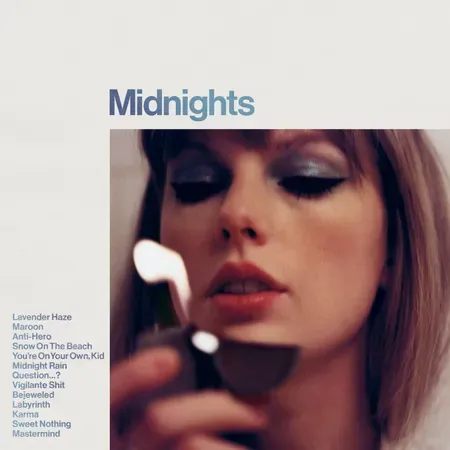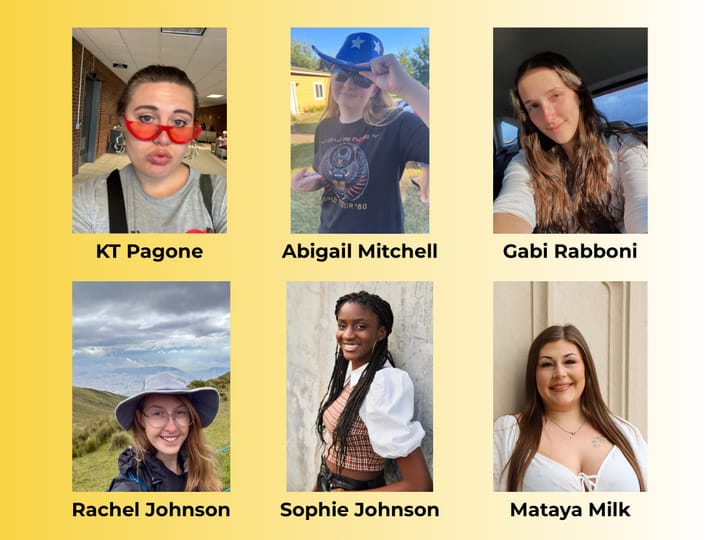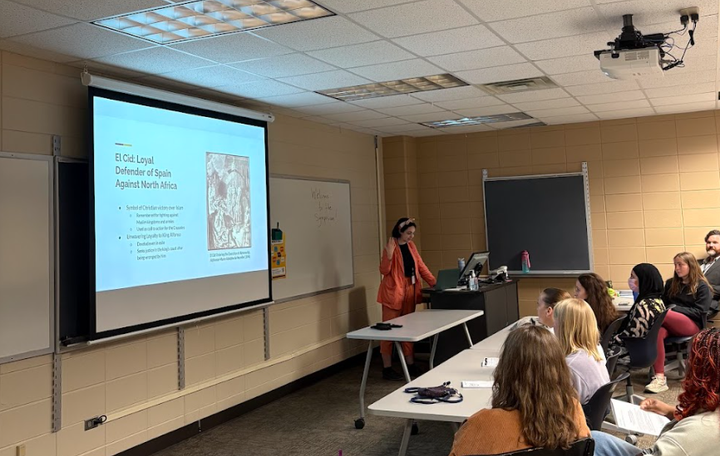“Midnights:” Taylor Swift’s striking return to pop

Taylor Swift’s 10th studio album, “Midnights,” returns to the pop sound she left with “Lover” in 2019.
Swift describes “Midnights” as stories from 13 sleepless nights throughout her life. With a darker, more experimental sound than Swift is known for, this album is an intimate look into Swift’s insecurities and vulnerable thoughts.
Coming from the intricate songwriting of 2020 sister-albums “Folklore” and “Evermore,” this album seems inferior by comparison. However, while “Folklore” and “Evermore” were storytelling albums that concentrated on lyricism, “Midnights’’ is a personal-account album centered around Swift’s experiences and anxieties. “Midnights” creates a thematic sound that her past albums have lacked.
The album is one of Swift’s strongest style-wise. The theme has been cohesive since the announcement, and the songs all flow together to create a connected sound.
However, the songwriting is clumsy in some spots and relies too heavily on rhyming. A lyric in the song “Antihero,” says, “I should not be left to my own devices. They come with prices and vices. I end up in crises.” Nonetheless, the awkward lyrics are easy to overlook when paired with interesting sounds and heavy vocals.
Even without a lead single, the album has topped record boards and climbed the charts.
The album’s songs all have the same moody, honest and electric feel. With callbacks to past songs, this album engages Swift’s super fans while still feeling enjoyable for casual listeners.
The album opens strong with “Lavender Haze,” a synth-pop tribute to the glowy, perfect love one can feel in a relationship and the desperate attempt to protect it from public scrutiny and criticism. While the lyrics are intense, the song sounds upbeat and energetic, creating a satisfying welcome to the album.
While relationships are a large part of this album, Swift highlights self-reliance in track five, “You’re on Your Own, Kid,” where she grapples with being alone after a breakup. This song feels like a sequel to Swift’s song “Never Grow Up” from the “Speak Now” album in the way that it continues to explore feelings of loneliness as a person grows up and emerges out of childhood into the public eye.
With a jarring transition from track five, track six, “Midnight Rain,” features Swift leaving a man to make her own name. Swift’s style feels especially experimental in this track as she sings with a deeper version of her own voice. This is possibly the strongest song on the album because of its intense vocals and passionate lyricism.
The album’s weaker moments include track nine, “Bejeweled,” which feels a bit too cheesy for the album’s theme, and track four, “Snow on the Beach,” which features Lana Del Ray. The song ultimately lacks the usual finesse of the two skilled songwriters.
Ending the album is track thirteen, “Mastermind,” an amusing take on Swift getting someone to like her by scheming but feeling guilty about being a mastermind. The song ends with the boy admitting to Swift that he knew about the schemes the entire time. The lyrics of this song perfectly close the album as a whole and wrap up the intricacies of the album’s themes.
While the seven bonus tracks are incredibly written and fit well into Swift’s discography as a whole, they don’t seem to have a place on the “Midnights” album. Track seventeen, “High Infidelity,” and track eighteen, “Glitch,” are the only two that seem to fit the themes and sounds of “Midnights,” but even then, they work better as a separate entity than on the main album.
Overall, this album has powerful highs and disappointing lows. Swift continues to push limits and explore new genres in creative ways. While not all listeners will be fans of this style, it continues the overall arc of the past years in Swift’s discography and introduces a new group of fans to Swift’s music.



